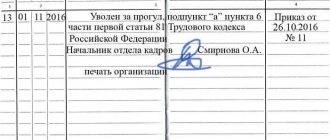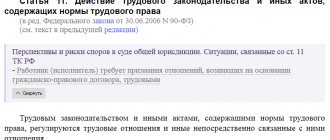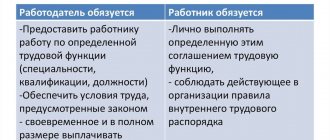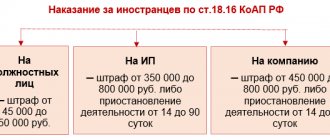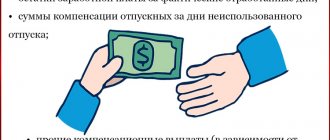An employee has the right to go to court to resolve an individual labor dispute within three months from the day he learned or should have learned about a violation of his rights, and in disputes about dismissal - within one month from the date he was given a copy of the dismissal order or the day of issue of the work book. The employer has the right to go to court in disputes about compensation by the employee for damage caused to the employer within one year from the date of discovery of the damage caused. If, for good reason, the deadlines established by parts one and two of this article are missed, they may be restored by the court.
Arbitrage practice
Resolution of the Plenum of the Supreme Court of the Russian Federation dated March 17, 2004 No. 2 (as amended on November 24, 2015)
Resolution of the Plenum of the Supreme Court of the Russian Federation dated May 29, 2018 No. 15
Determination of the Judicial Collegium for Civil Cases of the Supreme Court of the Russian Federation dated June 10, 2019 No. 13-KG19-3
Determination of the Judicial Collegium for Civil Cases of the Supreme Court of the Russian Federation dated February 25, 2019 No. 44-KG18-33
Determination of the Judicial Collegium for Civil Cases of the Supreme Court of the Russian Federation dated January 28, 2019 No. 78-KG18-74
Determination of the Judicial Collegium for Civil Cases of the Supreme Court of the Russian Federation dated May 23, 2016 No. 18-КГ16-21
What is an individual labor dispute
The concept of individual labor disputes is fixed in the articles of the Labor Code of the Russian Federation. In particular, in this context it is necessary to perceive all conflict situations that have arisen between an employee and an employer and which have not been resolved peacefully. The mandatory features of such a dispute include:
- On one side of the conflict is the employer, represented by the director of the enterprise. And the second may be a current employee of the company, a dismissed employee, or a candidate applying to fill a vacant position.
- The misunderstanding arose due to the reluctance of the participants to comply with legal requirements, the terms of the employment contract, or the provisions of local administrative documents. Often the workers themselves make claims, but the production manager can also initiate a dispute.
- The conflict is considered to have become an ITS after the injured party applies to the commission or court.
In addition, in the process of considering the situation that has arisen, a conclusion may be made to amend the current employment contract, but only in the area of expanding the rights of employees.
What disputes are brought to court?
The parties to the employment contract—the employee or the employer—apply to the court to resolve an individual labor dispute. The prosecutor or trade union still has the right to speak on the side of the worker. To protect the rights and interests of the parties, there is a statute of limitations in labor law - a period during which interested parties have the opportunity to file a claim.
It is not necessary to bring a claim; the law allows one of the parties to first go to the Labor Dispute Commission (LCC), and if the other party does not agree with its decision, then to the court. But this stage is optional. In addition, there are categories of disputes for which the CCC is incompetent, and they are resolved only in court based on a claim.
If we are talking about an employee, then the grounds for filing a claim are as follows:
- about reinstatement at work, regardless of the grounds for termination of the contract;
- on changing the date and wording of the reason for dismissal;
- about transfer to another job;
- about payment for the time of forced absence or about payment of the difference in wages for the time of performing lower-paid work;
- about unlawful actions (inaction) of the employer when processing and protecting the employee’s personal data.
The company's management has the right to go to court, bypassing the CCC, only with the question of compensation by the employee for damage caused to the employer.
IMPORTANT!
In accordance with Art. 199 of the Civil Code of the Russian Federation, a claim for the protection of a violated right is accepted for consideration by the court regardless of the expiration of the limitation period. All claims and procedural deadlines for labor disputes are regulated by the Code of Civil Procedure accordingly. The claim is filed in a court of general jurisdiction, and in disputes about accrued but unpaid wages up to 50,000 rubles - in a global court. Over 50,000 rubles - to the district.
Disputes are also considered directly in court:
- about refusal to hire;
- on discrimination on national, gender, religious and other grounds;
- according to applications from persons working under an employment contract for individuals who are not individual entrepreneurs, and employees of religious organizations.
Going to court. Resolution of labor disputes considered in court
As is known, anyone and everyone who deems it necessary can go to court.
Citizens of the Russian Federation, foreigners, stateless persons - there are no restrictions. On behalf of minors or other incompetent persons, their official representatives apply: parents, guardians, etc. The Russian judicial system is stepwise, built on the principle of jurisdiction and jurisdiction.
If you look from the point of view of jurisdiction, then in paragraph 1 of Art. 22 of the Code of Civil Procedure of the Russian Federation states that labor disputes are considered in courts of general jurisdiction.
The jurisdiction has the following features:
You can find more complete information on the topic in ConsultantPlus. Free trial access to the system for 2 days.
- Claims with demands for the restoration of labor rights can be filed at the plaintiff’s place of residence (subclause 6.3 of Article 29 of the Code of Civil Procedure of the Russian Federation). In this case, the condition on the jurisdiction of disputes, enshrined in the employment contract and contradicting this rule, is not subject to application (determination of the Supreme Court of the Russian Federation dated August 14, 2017 in case No. 75-KG17-4).
- If the dispute that occurred between an employee and an employer is civil, then it will be dealt with by a court determined according to the rules of Art. 23, 24 Code of Civil Procedure of the Russian Federation. This also applies to cases where civil obligations are specified in the employment contract. For example, issuing an interest-free loan (clause 1 of the resolution of the Plenum of the RF Armed Forces “On the application ...” dated March 17, 2004 No. 2).
Thus, the district or city court acts as the first instance for consideration of labor disputes.
The plaintiff-employee does not pay the state duty in any case (Article 393 of the Labor Code of the Russian Federation).
Deadlines
The general limitation period is 3 years (see Article 196 of the Civil Code of the Russian Federation). This is the time during which the plaintiff seeks protection of his rights. The Labor Code does not contain the term limitation period for labor disputes, but Art. 392 of the Labor Code of the Russian Federation talks about the period during which it is allowed to go to court to resolve an individual labor dispute.
| Type of individual labor dispute | Plaintiff | Deadline for application |
| About compensation | Employer | Within one year from the date of discovery of the damage caused |
| On non-payment or incomplete payment of wages and other payments due to the employee | Worker | Within one year from the date of payment of the specified amounts, including in case of non-payment or incomplete payment of wages and other payments due upon dismissal |
| About dismissal | Worker | Within one month from the date of delivery of a copy of the dismissal order, or from the date of issuance of the work book, or from the date of provision to the employee in connection with his dismissal of information about his work activity |
| Other individual labor disputes (illegal transfer, certification results, illegal disciplinary action, etc.) | Worker | Within three months from the day when he learned or should have learned about the violation of his right |
Thus, the statute of limitations for reinstatement at work is one month from the date of dismissal, and an employee has the right to apply for recovery of amounts not fully paid upon dismissal within a year from the date of settlement.
The limitation period applies only upon the application of a party to the dispute made before the court makes a decision. The expiration of the limitation period, the application of which is declared by a party to the dispute, is the basis for a decision to reject the claim.
Pre-trial dispute resolution
When resolving a labor dispute, the pre-trial procedure is not mandatory (Article 391 of the Labor Code of the Russian Federation). That is, a person who believes that his rights have been violated can appeal both to the labor dispute commission and directly to the court. In some cases, provision is made for pre-trial settlement of disputes (Article 135 of the Code of Civil Procedure of the Russian Federation). Thus, when filing a claim in court, compliance with this procedure must be confirmed, otherwise the court may refuse to consider the claim.
Any competent person by power of attorney has the right to represent the interests of the plaintiff (employee) in court or pre-trial proceedings (Articles 48, 49, 53 and 54 of the Code of Civil Procedure of the Russian Federation).
According to Article 132 of the Code of Civil Procedure of the Russian Federation, the following documents must be attached to the claim:
• copies of the claim in accordance with the number of defendants and third parties;
• receipt of payment of state duty (not charged for labor disputes);
• power of attorney or other document giving the right to represent the plaintiff in court;
• documents that confirm the circumstances on which the plaintiff’s claims are based, copies of these documents in accordance with the number of defendants and third parties;
• evidence (if necessary, if provided by law) of compliance with the pre-trial procedure for resolving the dispute;
• calculation of the amount that is recovered or disputed under the claim, endorsed by the plaintiff or his representative, copies of the calculation in accordance with the number of defendants and third parties.
Restoring deadlines
Labor legislation does not provide for the suspension of deadlines for going to court. Even if you contact the CTS, this will not stop the period. But what should an employee do who missed him for a good reason?
Article 392 of the Labor Code of the Russian Federation determines: if the statute of limitations for the dismissal of an employee or other disputes for a good reason has expired, then the court has the right, at the request of the plaintiff, to restore it. What reasons are valid is not defined in the legislation; this question is answered by judicial practice. In accordance with the resolution of the plenum of the Armed Forces of the Russian Federation dated March 17, 2004 No. 2, these reasons are:
- plaintiff's illness;
- being on a business trip;
- force majeure (floods, fires, earthquakes, other natural disasters);
- caring for a sick family member.
The Plenum of the Supreme Court in its resolution No. 15 dated May 29, 2018 adds:
- appealing in violation of the rules of jurisdiction to another court, if the initial application was filed within the prescribed time;
- contacting the prosecutor's office or State Tax Inspectorate.
The list of valid reasons specified in the resolutions of the RF Armed Forces that make it possible to restore the deadline for filing a claim in labor disputes is not exhaustive. The court in each specific case has the right to establish others, taking into account the circumstances of the case. If a deadline is missed, a petition is filed for its restoration or this is stated in the statement of claim itself.
Terms and procedure for consideration of labor disputes
Art. 392 of the Labor Code of the Russian Federation establishes a limitation period:
- 1 month, if the dismissed person does not agree with the reason for dismissal or with the very fact of severing the employment relationship;
- 1 year for disputes regarding non-payment, including partial, of wages;
- 3 months for other labor conflicts.
The judge does not have the right not to accept the claim because the filing deadline has passed (clause 5 of Resolution No. 2). If the defendant indicated a delay, the court will examine the reasons for this.
In para. Clause 5 of Resolution No. 2 lists situations that can be considered valid, and as a result of this, the deadline for filing a claim will be restored. For example, the plaintiff's illness.
As for the time limits for consideration of labor disputes in court , the Supreme Court of the Russian Federation in paragraph 7 of Resolution No. 2 drew attention to the fact that they must be strictly observed and not violate Art. 154 Code of Civil Procedure of the Russian Federation:
- reinstatement to the previous position - no more than 1 month;
- other labor disputes - 2 months.
The time limit may be extended if the court considers the case to be complex.
Review period
A month after filing a complaint, the interested person can familiarize himself with the received conclusion of the CCC on an individual dispute. Thus, the following categories of disputes are distinguished:
- 1 month is the deadline during which consideration of a dispute regarding violations can be initiated;
- 10 days – the time allotted for sending their representatives to the local commission (counted from the date of receipt of the application or order for the formation of the CCC);
- 10 days – consideration of the conflict and making a final decision (the date of receipt of the complaint is not taken into account);
- 10 days – period for appealing the decision;
- 3 days is the time limit for the participants to fulfill the decision made.
If the conflicting parties have not voluntarily complied with the order of the CCC, then the interested citizen (a member of the team or a representative of the director) can contact the bailiff service to enforce the measures taken. This can be done within 90 days from the end of the meeting on the dispute.
You may be interested in: Procedure for calculating and paying for forced absence
It is possible to resolve the conflict immediately in court without forming a CCC. But the judge will definitely ask why there were no attempts to resolve the individual dispute on their own. This will not affect the final verdict, but the employee will have a better chance of satisfying the claim if he was previously denied satisfaction of the stated requirements.
Article 394. Making decisions on labor disputes regarding dismissal and transfer to another job
If dismissal or transfer to another job is recognized as illegal, the employee must be reinstated in his previous job by the body considering the individual labor dispute.
The body considering an individual labor dispute makes a decision to pay the employee the average salary for the entire period of forced absence or the difference in earnings for the entire period of performing lower-paid work.
At the request of the employee, the body considering an individual labor dispute may limit itself to making a decision to recover in favor of the employee the compensation specified in part two of this article.
If the dismissal is declared illegal, the body considering the individual labor dispute may, at the request of the employee, decide to change the wording of the grounds for dismissal to dismissal of one’s own free will.
If the wording of the grounds and (or) reasons for dismissal is recognized as incorrect or not in accordance with the law, the court considering an individual labor dispute is obliged to change it and indicate in the decision the grounds and reasons for dismissal in strict accordance with the wording of this Code or other federal law with reference to the relevant article , part of an article, paragraph of an article of this Code or another federal law.
If the dismissal is declared illegal and the term of the employment contract has expired at the time the dispute is being considered by the court, then the court considering the individual labor dispute is obliged to change the wording of the grounds for dismissal to dismissal upon expiration of the employment contract.
If, in the cases provided for by this article, after declaring the dismissal illegal, the court makes a decision not to reinstate the employee, but to change the wording of the grounds for dismissal, then the date of dismissal must be changed to the date of the court’s decision. If, by the time the said decision is made, the employee, after a contested dismissal, has entered into an employment relationship with another employer, the date of dismissal must be changed to the date preceding the day of commencement of work for this employer.
If the incorrect formulation of the grounds and (or) reasons for dismissal in the work book prevented the employee from taking another job, then the court decides to pay the employee average earnings for the entire period of forced absence.
In cases of dismissal without legal grounds or in violation of the established procedure for dismissal or illegal transfer to another job, the court may, at the request of the employee, make a decision to recover in favor of the employee monetary compensation for moral damage caused to him by these actions. The amount of this compensation is determined by the court.
Grounds and causes of labor disputes
A conflict between an employer and an employee can break out in any area of labor relations. Most often, disputes are related to:
- unlawful refusal of employment and unlawful dismissal;
- failure by the employer to comply with labor protection conditions and rules;
- social guarantees for employees;
- non-payment of wages.
A labor dispute is a disagreement that has arisen between an employer and an employee.
Among the most common causes of labor conflicts are:
- legal illiteracy of management;
- ignoring the legal rights of employees;
- poor working conditions;
- lack of a clear distribution of responsibilities among members of the workforce;
- mismatch between the employee’s qualifications and the position held;
- difficult psychological climate in the team;
- incorrect leadership style;
- employee ignorance of their legal rights and obligations.
Non-payment of wages and illegal dismissal are the most common causes of labor disputes.


